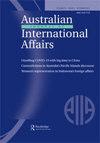重新发现南极法在二十一世纪初的重要性
IF 1.8
3区 社会学
Q2 INTERNATIONAL RELATIONS
引用次数: 0
摘要
国际法为国际关系的行为提供了一个法律秩序体系。在这一体系内,国家可以在一个连续的地理区域内建立区域法律制度,以解决其自身的区域问题。在南极洲,活跃在该地区的国家制定了一个独特的地区法律制度(在这里被概念化为“南极法”)来解决南极问题。在二十世纪的大部分时间里,《南极法》在理解南极地区内部的人类互动和国际秩序方面发挥了核心作用。然而,在过去的二十年里,对南极法律的法律和区域性质的重要性的理解变得不那么突出。相反,南极学术(包括法律分析)已经转向普遍主义视角、跨学科学术和批判性方法。我们认为,这些做法低估了该地区法律秩序的重要性。该区域内的新挑战将需要利用这一区域法律秩序作出回应。因此,本文件旨在为重新发现“南极法”概念的重要性迈出第一步,该概念是一种区域和法律制度,在南极区域内建立成功的国际秩序以应对21世纪初的挑战方面发挥着关键作用。本文章由计算机程序翻译,如有差异,请以英文原文为准。
Rediscovering the importance of Antarctic Law for the early twenty-first century
ABSTRACT International law provides a system of legal order for the conduct of international relations. Within this system, states may constitute regional legal regimes in a continuous geographical area to address their own regional problems. In Antarctica, states active in the region have developed a sui generis regional legal regime (conceptualised here as ‘Antarctic Law’) to address problems of the Antarctic. During most of the twentieth century, Antarctic Law played a central role in understanding human interaction within, and international ordering of, the Antarctic region. However, over the last two decades, understanding the importance of the legal and regional nature of Antarctic law has become less prominent. Instead, Antarctic scholarship (including legal analysis) has moved towards a universalist perspective, interdisciplinary scholarship and critical approaches. We argue these approaches have under-appreciated the importance of the legal ordering of the region. New challenges within the region will require responses that draw on this regional legal ordering. This paper therefore aims to be a first step towards rediscovering the importance of the concept of ‘Antarctic Law’ as a regional and legal regime with a key role in providing successful international order within the Antarctic region to meet the challenges of the early twenty-first century.
求助全文
通过发布文献求助,成功后即可免费获取论文全文。
去求助
来源期刊

Australian Journal of International Affairs
INTERNATIONAL RELATIONS-
CiteScore
3.20
自引率
13.30%
发文量
44
期刊介绍:
AJIA is the journal of the Australian Institute of International Affairs. The Institute was established in 1933 as an independent and non-political body and its purpose is to stimulate interest in and understanding of international affairs among its members and the general public. The aim of the Australian Journal of International Affairs is to publish high quality scholarly research on international political, social, economic and legal issues, especially (but not exclusively) within the Asia-Pacific region. The journal publishes research articles, refereed review essays and commentary and provocation pieces. ''Articles'' are traditional scholarly articles. ‘Review essays’ use newly published books as the basis to thematically examine current events in International Relations. The journal also publishes commentaries and provocations which are high quality and engaging pieces of commentary, opinion and provocation in a variety of styles. The Australian Journal of International Affairs aims to analyse international issues for an Australian readership and to present Australian perspectives to readers in other countries. While seeking to stimulate interest in and understanding of international affairs, the journal does not seek to promote any particular policies or approaches. All suitable manuscripts submitted are sent to two referees in a full ''double blind'' refereeing process.
 求助内容:
求助内容: 应助结果提醒方式:
应助结果提醒方式:


